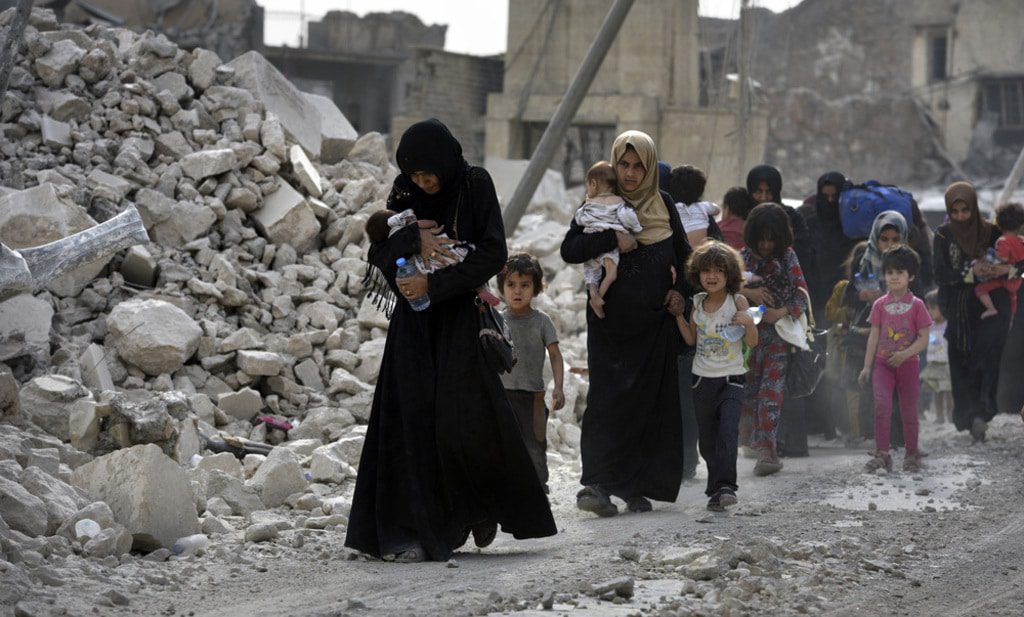
In a report released a day after the Iraqi government declared victory over the Islamic State (IS) in Mosul, human rights organization Amnesty International accused the militant group of war crimes but also said Iraqi forces and the United States-led coalition had likely violated international law during the struggle for control of the city.
Iraqi Prime Minister Haider al-Abadi declared “total victory” in Mosul on 10 July 2017, although sporadic clashes with IS fighters continued and United Nations officials estimated that hundreds of civilians remain trapped.
The White House also trumpeted the victory in a statement as ‘tremendous progress’. ‘The victory in Mosul, a city where IS once proclaimed its so-called “caliphate”, signals that its days in Iraq and Syria are numbered,’ the statement read. ‘We will continue to seek the total destruction of IS.’
However, Amnesty International called the battle for west Mosul, which was launched in October 2016 by Iraqi and US-led coalition forces in an attempt to rout IS from the city and surrounding area, a ‘civilian catastrophe’.
‘Civilians in west Mosul have been ruthlessly exploited by the armed group … which has systematically moved them into zones of conflict, used them as human shields and prevented them from escaping to safety,’ the organization said in a report released on 11 July 2017. ‘They have also been subjected to relentless unlawful attacks by Iraqi government forces and members of the US-led coalition.’
Researchers visited west Mosul and camps for displaced people in Nineveh and Erbil in March and May 2017 and interviewed 151 civilian residents. The researchers concluded that IS ‘committed serious violations of international humanitarian law, including war crimes’ and that Iraqi government and US-led coalition forces ‘appear to have committed repeated violations of international law, some of which may amount to war crimes’.
One man interviewed said that when he attempted to escape, he was shot in the leg by a sniper. When he returned home after taking shelter in an abandoned building, he passed the bodies of about 75 people – some of them his neighbours – who had also tried to escape. Because of the difficulty of escaping, many families chose to flee across the frontline during active fighting, when IS fighters would be otherwise occupied, the report said.
A 22-year-old man named Abdullah described how he and his family fled their house as Iraqi forces advanced, amid the sounds of air strikes, car bombs and shooting. “When we left the house, everyone just had to take care of themselves,” he told researchers. “We were running, running as fast as we could. [IS] fighters were shooting at the Iraqi forces and at us. I saw one woman who was killed by the snipers.”
Other civilians described having food and water confiscated or withheld by IS and being denied medical care because hospitals were treating the group’s fighters or, in some cases, because fighters and their families were living in the hospitals to protect themselves from air strikes.
The report went on to criticize pro-government forces for their use of ‘indiscriminate bombing’. Airwars, one of the groups monitoring civilian casualties, said as many as 5,800 people may have been killed by Iraqi and coalition forces. ‘Pro-government forces failed to adequately protect civilians, carrying out attacks that appear to have been disproportionate or indiscriminate, killing and injuring thousands of civilians and destroying homes and infrastructure,’ the report said.
In particular, the report condemned the use of improvised rocket-assisted munitions (IRAMs), unguided artillery rocket-type weapons combining military-grade ordnance with makeshift parts, and ‘grads’, Soviet-designed vehicle-mounted multiple-launch rocket systems. ‘IRAMs are inherently indiscriminate, and their use in a densely populated area such as west Mosul invariably violates international humanitarian law,’ the report said.
Researchers documented 45 attacks that killed at least 426 civilians and injured more than 100 in neighbourhoods across west Mosul. In the deadliest of these, at least 105 civilians were killed in an air strike targeting two snipers in the Mosul al-Jadida neighbourhood on 17 March 2017. In another case, an air strike targeted the Khaled Ibn al-Waleed mosque where 60 to 70 people were praying, causing the roof to collapse and destroying two nearby houses. A witness said that at least four people died and dozens were injured. The witness also said a car belonging to the IS religious police was parked outside the mosque and one or two fighters were praying inside at the time of the attack, but that most of those inside were civilians.
In some cases, government forces attempted to warn civilians to leave by dropping leaflets or sending out broadcasts. Even when civilians got the warnings, however, they were often prevented from escaping, the report said.
IS ‘committed egregious violations of international humanitarian law and human rights abuses before and during the battle for west Mosul’, the report concluded, but that ‘does not lessen the burden upon pro-government forces to select lawful targets and to strike them in a way that is not indiscriminate or disproportionate’.
Amnesty International recommended that the coalition pay reparations to victims and the families of victims injured and killed in the bombings and establish an independent commission to investigate potential violations of international law.
In response to the report’s accusations, US Air Force Brigadier General Andrew Croft said on National Public Radio’s Morning Edition that the coalition had “done, in my view, the absolute best job we can to avoid civilian casualties”.


